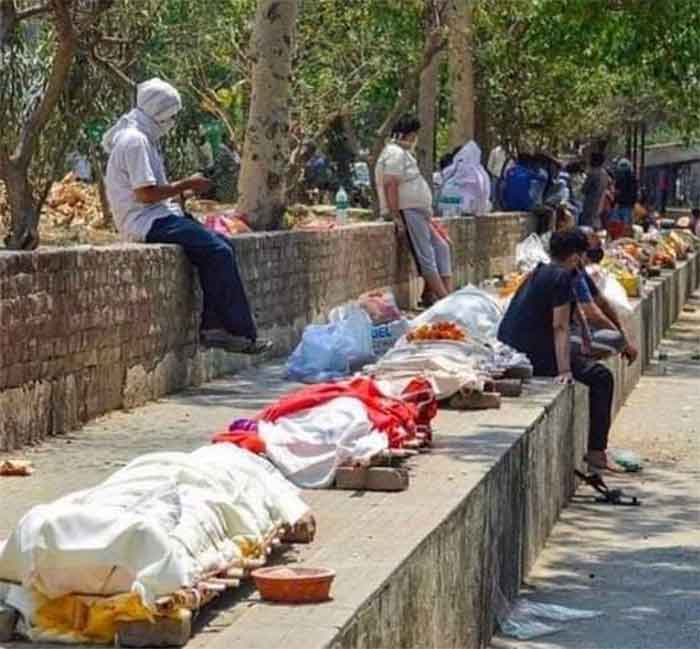
As coronavirus fears spread, a world-renowned virologist has explained when Covid-2019 will fade away and, whether medical masks are of any use.
Around the world, public anxiety grows, with people embarking on panic buying and even fighting for medical masks.
But for initiated professionals, the Covid-2019 is just one of many epidemics that come and go without inflicting devastating losses to humankind.
Virologist Dmitry Lvov, who made his name on researching the most dangerous viruses in the former USSR and beyond, explained why this is the case during a sit-down with journalist Anton Krasovsky for RTD’s ‘Epidemic’ series.
Is Covid-2019 deadlier than other viruses?
The novel virus, which so far killed over 3,000 people, is hard to fight because it rapidly hits the lower levels of respiratory systems, causing blood and oxygen to break into the alveoli.
Consequently, “blood, blood plasma and other elements of blood cause pulmonary edema so that the human can’t breathe and dies,” Lvov said. “And it’s very hard to reach them.”
Whereas nearly 90,000 coronavirus cases were reported worldwide, “flu has infected around 5 million.” And despite its lesser mortality, influenza has killed “a lot more people” within the same period of time.
‘Quarantine makes some sense, but wearing mass-market medical masks do not’
With no coronavirus vaccine in existence, quarantine has become the major tool to contain its spread. Whereas China has put entire cities on lockdown, other countries quarantined travelers who returned or were evacuated from the virus-hit region.
“In case of coronavirus, it makes some sense,” Lvov commented, before taking on other protective measures, namely the mass-market medical masks.
“These cheesecloth rags called ‘masks’ are not masks, they’re useless,” he stated. However, dense masks equipped with respirators which are seen in China and Russia, are “a different thing.” Such masks “protect against [the virus], they protect the others if you’re sick” – but they are almost useless against the inbound threat.
Asked again if medical masks are an efficient protective measure, the scientist reiterated: “Usually not. Or to the least extent.”
The virus can easily make it into the human body through eyes, so the major feature of the sought-after mask is to ensure that “your large drops [of saliva] and your snot, excuse me, will stay with you.”
I’m not saying you shouldn’t wear masks – you should, but there’s no guarantee.
What is in store for the coronavirus outbreak?
It’s hard to foresee the outcomes of the epidemic, but “if everyone worked like the Chinese, it would end very quickly,” Lvov believes. Chinese scientists have quickly framed the virus, examined its genetic structure and published the results.
Beijing has taken “extraordinary measures” to battle the virus spread, so one should “congratulate their healthcare system and the government on the sweeping measures they’ve taken,” the Russian virologist stated, adding, “they did well.”
At this stage, he said, the Covid-2019 is dispersing slower than it was, and its outbreak is likely to end in a year, according to Lvov. The virus has not yet adapted to the human population, which is called “meeting of strangers,” and its chances of becoming a human-borne disease are “slim.”
At any rate, “it will return to bats and will pop up again in ten or twenty years, maybe in China, maybe in Russia,” he predicted.
China closes 1st coronavirus hospital, built in 10 days, after last group of recovered patients discharged
Authorities in Wuhan have closed the city’s first makeshift hospital after discharging the last batch of 34 recovered coronavirus patients, as the rate of infection in the city has dropped dramatically.
Wuhan was the site of the original outbreak of the coronavirus epidemic, and the city’s response, building a new hospital in less than two weeks to handle Covid-19 patients, was seen as a modern marvel with the total number of hospital beds in the city eventually going from 5,000 to 23,000.
The hospital’s last patients were given the all clear late Monday, according to state broadcaster CCTV, amid a sharp decline in Covid-19 cases in Hubei province.
Outside of Hubei province, there were only six new cases confirmed in mainland China over the weekend.
The hospital is one of 16 built across Hubei province to handle the epidemic, in which at least 12,000 people were treated.
The head of Wuhan’s largest temporary hospital, located in an exhibition centre with beds for 2,000 patients, confirmed plans to shutter that facility by the end of March.
“If nothing special happens, I expect the operation of our makeshift hospital, the biggest one in Wuhan, could complete its historical mission by the end of March,” said Dr. Zhang Junjian, the director of the hospital.
SIGN UP FOR COUNTERCURRENTS DAILY NEWS LETTER
















































